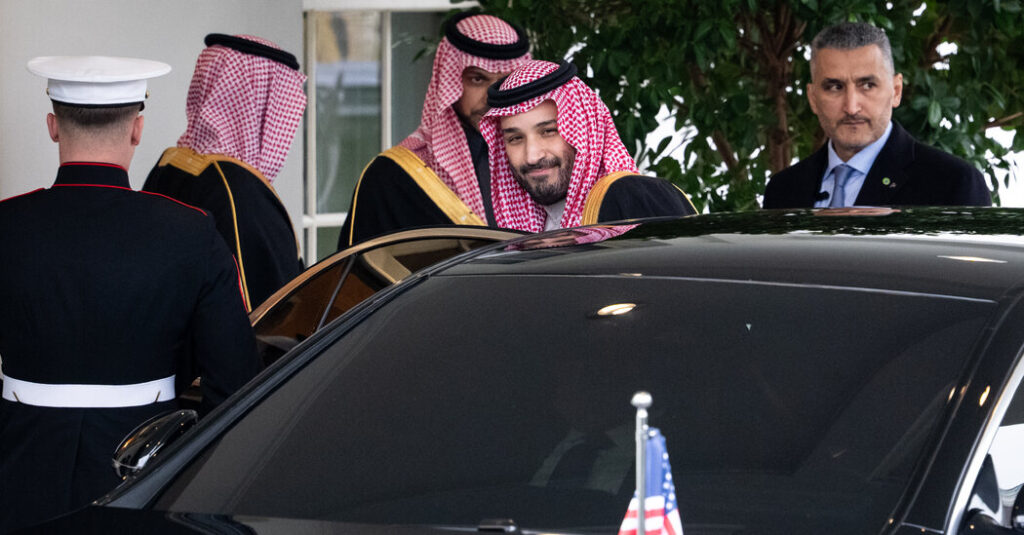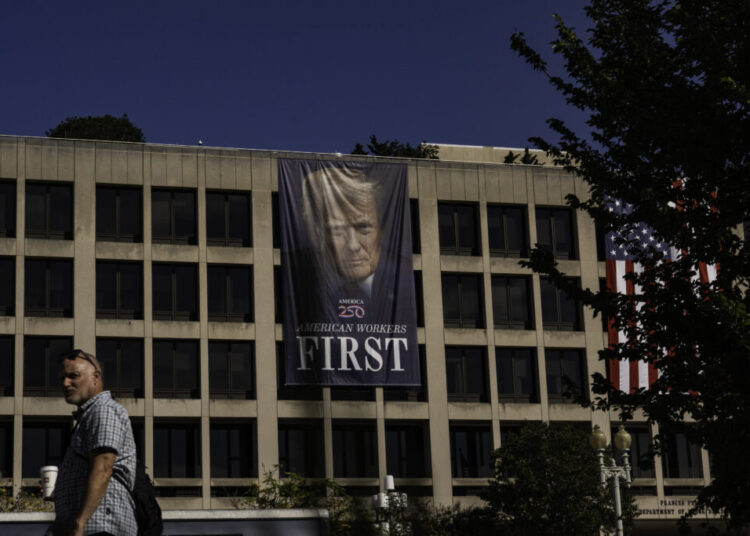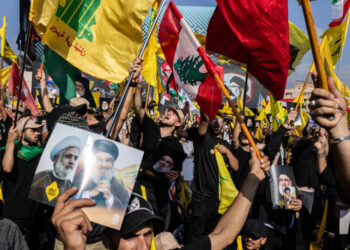Seven years after Crown Prince Mohammed bin Salman of Saudi Arabia was effectively banished from Washington after the murder of a prominent Saudi dissident, he returned on Tuesday to a welcome meant to signal that he sat at the center of President Trump’s effort to build a new Middle East.
It was, perhaps, the most astounding geopolitical restoration of modern times. The de facto leader of the largest and richest of the Arab states, who President Joseph R. Biden Jr. said should be treated as a “pariah” six years ago, reset relations on his own terms.
The crown prince got a commitment from Mr. Trump for F-35 stealth fighters, over Israel’s objections. At the same time, he managed to push off, most likely for years, any discussion of Saudi Arabia joining the Abraham Accords and recognizing the Jewish state.
“We want to be part of the Abraham Accords, but we also want to be sure that we secure a clear path of a two-state solution,” Prince Mohammed said in the Oval Office, uttering the phrase he knew that Prime Minister Benjamin Netanyahu would reject outright, as would much of the rest of Israel’s political establishment.
“We want peace with the Israelis,” he insisted. “We want peace with the Palestinians, we want them to coexist peacefully.”
Then, with the traditional business of the past 75 years of Middle East diplomacy pushed aside, Prince Mohammed uttered the words he knew his host wanted to hear, promising upward of a trillion dollars in purchases and investments in the United States — more than the size of his country’s sovereign wealth fund. (The crown prince carefully avoided saying over what period of time the investments would be made, recognizing that the president sought a big dollar figure, whether it was realistic or not.)
In return, it appears Prince Mohammed has a commitment for access to America’s most advanced computer chips, critical to building the vast data servers central to his plan to turn his country into an artificial intelligence powerhouse, with the electricity-hungry processors powered by a mix of Saudi oil and renewable energy.
And without ever mentioning China, he made it clear in the run-up to the visit that Beijing was willing to step in to supply any technology that Washington hesitated to provide.
“We are seeing the ultimate ‘comeback visit,’” said Meghan O’Sullivan, an energy expert and former Bush administration official who now directs the Belfer Center at Harvard.
“M.B.S. has made Saudi Arabia more relevant to U.S. interests than ever before,” she said, referring to Prince Mohammed by his initials. She said he was “aligning an aggressive tech strategy and an oil policy which is helping keep prices low.”
“At the same time,” she added, “he has skillfully played the China card, suggesting that what Washington holds back will effectively be supplied by Beijing, undermining Washington arguments for restraint.”
The crown prince did not get everything he sought. A nuclear deal, which has been discussed and debated with Washington for a decade, was pushed into the future again, with the two sides agreeing to some unspecified deadlines for resolving the thorny issue of whether the Saudis would be permitted to enrich their own uranium. Such capability would give them self-sufficiency in making reactor fuel — and the technology to build their own nuclear weapons, which has long been the sticking point.
It was also unclear whether the two sides had reached a full-scale defense pact, which both sides have been declaring is imminent. There was little public discussion of it in the Oval Office. And the White House published a vague “fact sheet” rather than the agreement itself, which mentioned several areas of cooperation, but fell well short of the kind of mutual defense commitments the United States has with, say, Japan, South Korea and the Philippines.
But in winning his case to put America’s most advanced fighters on the runways of Saudi air bases and the most advanced American chips into the data centers, Prince Mohammed is integrating his country into the American tech stack. And he knows these are more than jets and chips. They are symbols that the Saudis see themselves as part of the extended “West,” just shy of a quarter century after the Sept. 11 attacks were pulled off largely by Saudi citizens.
For now, among Middle East powers, only Israel possesses the F-35, a monopoly it considers critical to the “qualitative military edge” America has long guaranteed for the country. Mr. Trump has not addressed the question of how to square that commitment with his decision to sell the advanced fighters to the Saudis. The White House fact sheet omitted a basic fact: how many F-35s the Saudis would be able to order.
Political scientists and Middle East experts will study for years how the crown prince pulled this off. It was not a forgone conclusion that he would be able to, even with his mix of social reform and political brutality at home. But it helped that the young Saudi leader has developed a dead-accurate reading of how to manage the American president.
The first clues came in 2018, in the months after the dismemberment of Jamal Khashoggi, the onetime Saudi official-turned-dissident, and a columnist for The Washington Post.
Mr. Trump, only a year in office, said it was not clear who was responsible for the killing, which took place in Turkey. But Mr. Trump said if the crown prince were responsible, he would be held responsible.
Then, inconveniently, the C.I.A. issued a report saying with high confidence that the crown prince had known about the plot and had most likely approved an order to capture or kill the dissident. The report immediately leaked, to the administration’s fury. But it was clear the crown prince could not step on American territory without facing protests, at best.
Then came the coronavirus pandemic, and lockdowns. The Saudi leader used time, business deals and a gradual outreach to Washington, patiently waiting for his moment. Mr. Biden came for a visit — one that some of his advisers thought was crucial, and others regarded as a huge mistake — and fist-bumped the young prince. A strategic relationship began to revive.
By the time the second Trump administration took office, it was the crown prince’s moment. So it was no surprise that Mr. Trump reacted with fury when an ABC reporter asked Prince Mohammed about that C.I.A. report. Mr. Trump defended the crown prince, noting that Mr. Khashoggi was “extremely controversial,” as if that were a justification for murder.
“Things happen,” Mr. Trump said, the dismissive phrase that is likely to linger long after his guest departs from Washington.
The crown prince, clearly ready for the question, was armed with a better answer. “It’s really painful to hear anyone losing his life for not real purpose or not in a legal way,” he said, adding, “We’ve improved our system to be sure that nothing happened like that” in the future.
It may be months, or years, before anyone can conclude, with certainty, whether the deals announced on Tuesday are as big as both leaders described them. Congress gets to vote on the F-35s, and the wait-list is long: About 20 countries either possess the planes or have them on order. They cost about $80 million to $110 million each, depending on the model, and it may be a while before any are racing down Saudi runways.
Much can go wrong between now and then. The same is true for nuclear reactors: If the Trump administration adheres to the law, any agreement giving Saudi Arabia significant nuclear capability is subject to congressional approval, and who controls the enrichment technology will be critical.
The chips and data centers should move faster, and will be an early bellwether.
Of course, as America learned with China, there is far more to a full diplomatic relationship than business deals — national interests, human rights, common values are all part of the mix. Little of that was discussed on Tuesday, at least in public.
But in the Trump era, relationships are measured in swag, not treaties. And after the meetings on Tuesday, the Crown Prince’s aides were seen leaving the White House with gift bags in hand, including one embossed with the president’s signature — in gold, of course.
David E. Sanger covers the Trump administration and a range of national security issues. He has been a Times journalist for more than four decades and has written four books on foreign policy and national security challenges.
The post Once a Pariah, Saudi Prince Resets U.S. Relations on His Own Terms appeared first on New York Times.




